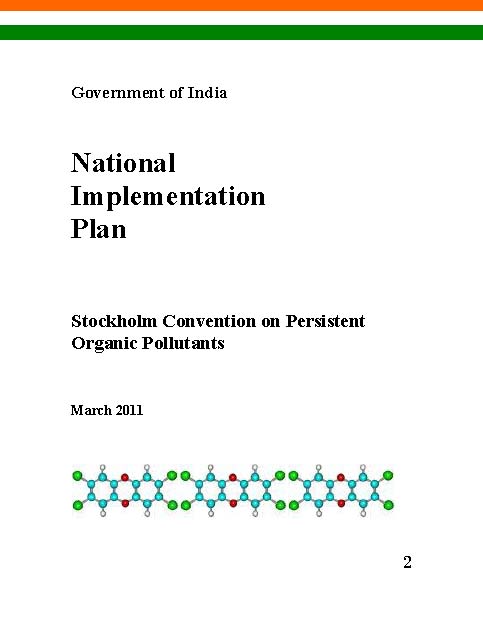/regions/political
Political
Wastewater reuse in apartment buildings in Bangalore - S Vishwanath
Posted on 14 Apr, 2011 10:12 AMEven if an apartment uses as less as 5000 litres of water a day it must have a wastewater recycling system which does such a thorough job that the treated wastewater is reused to replace fresh water and not for simply disposing off into the environment in a safe way. It is simply not good enough for treated wastewater to be used for watering lawns, an unnecessary demand.
Stockholm Convention on Persistent Organic Pollutants – Draft National Implementation Plan by the Ministry of Environment and Forests (2011)
Posted on 14 Apr, 2011 07:35 AM As per Article 7 of the Stockholm Convention, countries are required to develop the National Implementation Plan (NIP) of the Stockholm Convention on Persistent Organic Pollutants (POPs) to demonstrate how the obligations under the Convention would be implemented. The Convention was adopted with the objective of protecting human health and the environment from POPs and came into force from April 2006 in India.
As per Article 7 of the Stockholm Convention, countries are required to develop the National Implementation Plan (NIP) of the Stockholm Convention on Persistent Organic Pollutants (POPs) to demonstrate how the obligations under the Convention would be implemented. The Convention was adopted with the objective of protecting human health and the environment from POPs and came into force from April 2006 in India.
The Ministry of Environment and Forests, which is the nodal ministry for the Global Environmental Facility (GEF) and Stockholm Convention in India has prepared a NIP and has committed itself to its implementation subject to adequate assistance. It has had to harmonize the interests and stand points of different sectors involved and thereafter determine the position of the Indian government.
India understands that compliance with the obligations on Parties set out in the Convention will have a significant and positive influence not only on India‘s own chemicals management regime but also on the ultimate global success of the Convention. Since among the POPs only Dichloro Diphenyl Trichloroethane (DDT) and Polychlorinated Biphenyls (PCBs) are used in the country the inventory concentrated on DDT storages and facilities where PCB-containing electrical equipment was found.
Evaluation of crop production systems based on locally available biological inputs - A research paper (2006)
Posted on 14 Apr, 2011 01:28 AMHere the yields of crops grown by low-cost inputs including plant biomass are compared with chemical fertiliser-induced production.
The study was conducted over 1999-2004, and the findings conclude that the yields of low intensive biological farming are as good, if not better than chemical fertiliser intensive farming.
Dissemination of NDM-1 positive bacteria in the New Delhi environment and its implications for human health - An environmental point prevalence study published in The Lancet Infectious Diseases (2011)
Posted on 13 Apr, 2011 03:15 PMPlasmid-encoding Carbapenemase-resistant Metallo-B-Lactamase (PCM or NDM-1) is an enzyme that makes bacteria resistant, not only to a broad range of antibiotics such as carbapenems and other β-lactam, but also to multiple other antibiotic classes, leaving very few treatment options available, when a person gets infected with such bacteria.
Status of MGNREGA in Chattisgarh and Madhya Pradesh
Posted on 13 Apr, 2011 02:15 PMArticle courtesy: CGNet Swara
NREGA: No payment for a year, complaints do not work
Rasatulla Khan, state president of Samajwadi party in Chattisgarh, is talking about a village in Baloda bazar block where laborers have not got their NREGA wages for more than a year now.
NREGA: Gram Panchayat does not take any application for work
Ramdas Dhurve from Narsinghpur district in Madhya Pradesh, says that in their area Sarpach and Sachiv in Gram Panchayat do not accept any application for work under NREGA.
One day workshop cum training programme on organic terrace gardening,Vittal Mallya Scientific Research Foundation, 7 May 2011 , Bengaluru
Posted on 13 Apr, 2011 01:20 PMConsidering the health, environment, and even the convenience, organic terrace gardens complement well with today’s urban living. Apart from safe and fresh vegetables, the advantages in terms of physical exercise, clean air, happiness of mingling with nature and the resultant satisfaction is enormous. It is the need and the responsibility of every urban dweller to know, practice and promote urban farming especially terrace gardens for our own benefit and for the benefit of the society to which s/he owes.
Bio-remediation project announced for Buddha Nala, Ludhiana - MoEF Press release
Posted on 13 Apr, 2011 11:14 AMFollowing the invitation of Member of Parliament (Ludhiana) Mr. Manish Tewari, the Hon’ble Minister for Environment and Forests Mr. Jairam Ramesh along with officials of the Ministry of Environment and Forests including the Chairman of the Central Pollution Control Board, visited the site of the Buddha Nala in Ludhiana, Punjab in September of 2010.
Realisation of the fundamental right to water in rural areas: Implications of the evolving policy framework for drinking water – An article by Philippe Cullet in Economic and Political Weekly
Posted on 13 Apr, 2011 10:20 AMThe fundamental right to water in rural areas is well-established in India, but the actual content of this right has not been elaborated upon in judicial decisions. There is no general drinking water legislation that would provide this missing content.
Narmada dam - Land for some, hope for others - A short film from Video Volunteers
Posted on 13 Apr, 2011 10:16 AMAfter 3 decades of relentless fighting for rehabilitation, 113 tribal families displaced by Sardar Sarovar Dam on the River Narmada in India’s Madhya Pradesh have finally had their demand fulfilled. The families have received land on which they can now build their homes again. Rakesh says that the development has raised the hopes of thousands of others like him who are still awaiting resettlement.